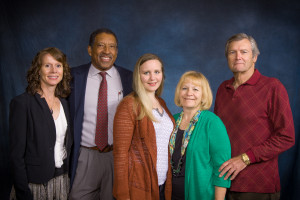
Professor Gregory Florant with Tracie Florant (left) and Melanie Richter (center) and donors Christine and William Richter at the College of Natural Sciences Scholarship Luncheon, October 15, 2015.
Dr. Greg Florant was only doing his job. A sophomore student interested in research started working in his lab to learn about being a scientist. Her grades were not stellar, but she showed a “fire in the belly,” and after bringing her on board in his lab, he began to lay the foundation of how good science works. “It’s my job,” he said.
Mentoring a student involves many things, including exploration of new research questions, teaching how to do science in a way that will create demonstrable reliable results, and understanding the goals of the student so that the partnership of mentor/mentee is productive. Through the years, it may involve writing letters of recommendation, reviewing papers and/or chapters, and refining ideas. Most of all, a good mentorship experience will include an investment of time and effort from both parties.
The student, Melanie Richter, worked in his lab, listened and followed his advice. She was interested in comparative animal physiology and focused on ground squirrels for her research projects. Long story short – she is now a PhD and is looking for a postdoctoral position. But she’s done more than that; she’s the catalyst in creating a new opportunity for Biology undergraduate students.
As a first generation student, Melanie’s parents, Chris and Bill Richter from Chicago, were especially grateful for Dr. Florant’s direction and attention to their daughter’s research interests and career. To express that gratitude, they stepped up and established a planned gift to fund future undergraduate fellowships: “The Richter and Florant Fellowship in Biology.”
The fellowship is designed to support a sophomore, junior or senior researcher in labs. What’s especially nice about the way the gift is structured is that it can be renewed every year. That way, a promising student, like Melanie, entering a lab as a sophomore could conceivably have research support for the rest of their undergraduate studies.
“We’re all proud of the work Dr. Florant does in our department,” said Department Chair Mike Antolin. “This is just a great example of where mentoring a promising student brought unexpected dividends that will help other students be successful.”
“I’m honored and somewhat flabbergasted,” says Florant. “This is the job of a professor. We take the clay and mold it into something that wasn’t there before.” And then he laughs, “Hopefully for the better!”
